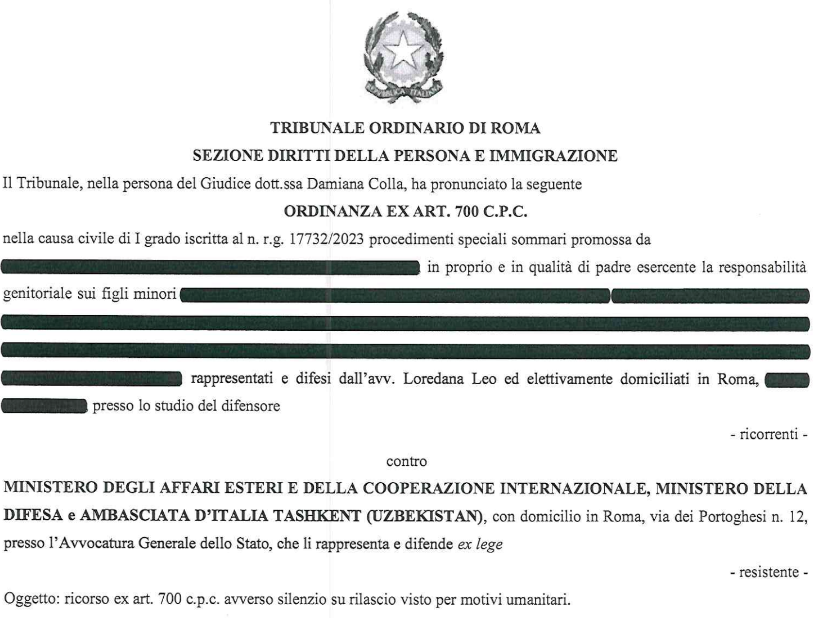The Court of Rome has – in a ruling of critical significance for refugees trying to apply for Italy’s humanitarian visa while still in precarious circumstances – ruled in favour of an Afghan family seeking safety in Italy. The presiding judge in June, ordered Italian authorities to issue the family with humanitarian visas which would allow their entry by 12 July.
The family of seven had originally sought humanitarian visas for a husband, wife, and 5 minor children in July 2022, to which the State had failed to respond. The husband of the family is a former member of the army, who had trained extensively in Italy, having obtained a degree in legal sciences as well as a master’s degree in law, in Italy. After returning to Afghanistan, he had continued to have close ties with NATO countries and with Italy, where he had come several times for training purposes.
The husband was supposed to have been evacuated in August 2021 alongside his father (who did make it to Italy during the evacuation rush which occurred when the Taliban originally returned to power) but the husband was unable to join his father as he was in another part of Afghanistan and as such couldn’t reach Kabul airport in time. The applicant husband, therefore, had been forced to flee to Tajikistan to escape the Taliban, while his family, wife and children, had remained in Afghanistan, but nonetheless in grave danger noting their ties to their husband/father.
Regardless of the husband’s ties to Italy, the Italian State resisted the application for humanitarian visas, and further objected to the inadmissibility of visa applications done via email, and objected to the admissibility of the power of attorney taken for the wife of the family as it had been being taken remotely.
Typically Italian regulations require powers of attorney for lawyers to be able to act on behalf of applicants to be formalised in the presence of the appointed attorney who must confirm that the instrument was executed before them, but in this case the power of attorney for the wife had been taken online due to the inherent and obvious danger which prevented the wife/mother of the family attempting to reach an embassy (Taliban rules forbid women travelling such distances without a male minder, aside from the inherent danger in Afghanistan generally, at present).
In her ruling, the judge allowed for the exception to the regular rules for powers of attorney, acknowledging the impracticability and danger inherent in seeking out an embassy in circumstances of such peril in dismissing the State’s concerns about the method in which the power of attorney was obtained, confirming the ability for powers of attorney to be taken “at a distance” in situations like these where there was no real possibility for the power of attorney to be given in the “ordinary” way due to severe safety concerns and general insecurity in a country.

Her honour stated* “In the light of principles deriving from international jurisprudence, it is … considered that, in compliance with this precise obligation to guarantee a fundamental right, it is legitimate for the appellant to grant her power of attorney to the lawyer by the only means accessible to her at the time, namely at a distance, with authentication of the signature by telematic means. The power of attorney issued by the applicant must therefore be considered valid and reject the objection of inadmissibility for lack of standing raised by the defendant in relation to the same.”
Her honour also referred to a judgment of the Court of Justice of 18.04.2023 in Case C-1/23 and the principles stated therein, stating that in that case the “Justice has made it clear that ‘it is essential that Member States show, in such situations, the necessary flexibility to allow the persons concerned to actually submit their application for family reunification in good time, by facilitating the submission of such an application and allowing, in particular, the use of remote means of communication. In fact, in absence of such flexibility, requiring, without exception, personal appearance at the time of the application .. in a country marked by armed conflict, the possibilities of travelling to competent diplomatic or consular posts can be considerably limited, so that, in order to satisfy the requirement of personal appearance, such persons, who may, in addition, be minors, would be obliged to wait until the security situation allows them to travel, or expose themselves to inhumane or degrading treatment, or even endangering their own lives, also evoking the detrimental consequences for the right to family unity which are realised in the case of the prevention of reunification, exactly as would be realised in the present case, in the absence of exceptional arrangements for the issue of the power of attorney to make up for the impossibility of access to ordinary ones, subject to possible subsequent regularisation’.
In this way, therefore, the Court considered the power of attorney issued online to be valid, subject to its subsequent ratification of the same once the relevant party has entered Italy.
This represents an extremely significant development in the law in Italy. The decision based the possibility of issuing an online power of attorney on fundamental rights of the national and international law, which arguably is the first time a decision of this kind has been made with relation to circumstances like these. It also means that in similar future cases, where there is similar danger/instability, lawyers representing clients in these precarious circumstances can venture a little more safely into the territory of taking powers of attorney through appropriate online means.
The judge similarly did away with the State’s argument that visa applications must be inadmissible by virtue of them being done by email for similar reasons – another decision of critical importance in humanitarian visa cases which are often characterised by the presence of imminent danger for applicants who are still in countries facing significant political and human rights turmoil.
Last but not least, the decision reaffirmed the availability of a road to humanitarian visas for applicants where the Italian State had “actually used its authority to exercise a form of power and control over the persons of the applicants”*.
The State has appealed the ruling and is not complying with the Court’s order, which is however immediately enforceable. The decision will be revisited in September 2023 due to the Italian State’s appeal, but for the moment this decision retains its significance for humanitarian visa applicants, acknowledging the practical and life-threatening difficulties of meeting in-person procedural requirements where the applicants would be in danger if required to travel to embassies while attempting to seek safety in Italy.
This family was provided pro bono legal assistance through the Italian Pro Bono Collaboration for Afghan Refugees (Italian acronym CIPBRA), an initiative created by four international law firms and CILD (with legal work led by Loredana Leo) for the purpose of providing pro bono legal advice and representation to Afghan asylum seekers seeking to access and settle in Italy.
*Original words from the decision have been translated into English
[Cover picture: Photo of Ricardo Gomez Angel via Unsplash]









